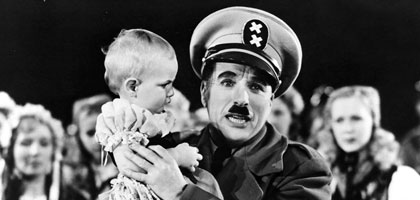77. The Great Dictator (1940)
United Artists 1923-52

Synopsis
In the Great War, a young Jewish barber (Chaplin) is a private fighting for his country Tomania. He dodges the shells and one day rescues a wounded flying officer named Schultz, but he loses his memory when the plane they are flying crashes. The private is sent to a hospital where he remains for the next 20 years, unaware of the changes that are taking place around him. In the meantime Tomania has been taken over by an insane dictator, Adenoid Hynkel (also played by Chaplin) who, with the help of his two ministers, Garbitsch and Herring is persecuting the people and in particular the Jews.
The Barber returns from the hospital, and goes to his barber-shop in the Ghetto, expecting to find everything as he left it 20 years before, not realising that he has been away for so long. When Hynkel's storm-troopers smash his store windows he is stunned and baffled. He finds a friend in Hannah, a beautiful orphan girl, who also lives in the Ghetto and is harassed by the storm troopers. She helps him when he is forced to replace the word 'Jew' on the barbershop window where he has tried to clean it off. She hits the storm troopers over the head with a frying pan but the barber is caught and about to be strung up when Schultz, now one of Hynkel's officers recognizes him as the little soldier who saved his life all those years ago.
For a while they enjoy comparative peace protected by Schultz . Meanwhile Hynkel wastes time in his palace being waited on hand and foot by toadies. Garbitsche tells him of the unrest in Tomania due to hunger and the adulteration of food with sawdust (from the best lumber) and advises the dictator to invade Osterlich as a distraction and before his rival Napaloni of Bacteria does it. Hynkel needs a loan from a Jewish financier and ceases temporarily his persecution of the Jews while the transaction is negotiated. In the ghetto, peaceful for once, the barber practices cutting women's hair (the men are all in concentration camps) on Hannah which so improves her looks that even the storm troopers stop to help her in the street when she drops some potatoes.
Hynkel, hearing of a workers' strike orders them all to be executed, but on reflection commutes the sentence while they train up a new workforce. Garbitsch reveals to Hynkel that all the leaders of the strikers have brown hair. He dreams of a blonde blue-eyed world with himself as the only brunette and dances around the office playing with an inflatable world. The Jewish financier refuses the loan, so Hynkel reimposes his anti-semitic rule. When Schultz questions the judgment of the invasion of Osterlich, the Dictator condemns him to a concentration camp. Schultz manages to escape to the ghetto, where he incites rebellion against the dictatorship. The inhabitants of the ghetto try to hatch an assassination plot but before they can carry out this plan he and the barber are both captured and interned in prison camp.
Pursuing his project of invading Osterlich, Hynkel invites Napaloni, Dictator of Bacteria to his palace. From the first they try to upstage each other and after a few comic misunderstandings Hynkel is able to enlist him as an ally whilst secretly planning to invade anyway. The invasion is successfully completed and Hannah, who has fled with her friends to Osterlich, again finds herself under the domination of Hynkel's cruel regime.
While the Great Dictator is celebrating his latest conquest by taking a vacation duck shooting in the country, Schultz and the barber escape from the concentration camp in stolen storm trooper uniforms. In the search that follows, Hynkel is arrested by his own soldiers, who think he is the barber, and Schultz sees that the barber is mistaken for the Dictator. Realising the importance of his new position the barber goes through with the imposture and in a speech before the assembled crowds of Tomania, denounces everything that Hynkel stands for and makes a rousing plea for democracy.
chaplin_credits
- Production:
- Chaplin-United Artists
- Producer:
- Charles Chaplin
- Director:
- Charles Chaplin
- Scenario:
- Charles Chaplin
- Photography:
- Karl Struss, Roland Totheroh
- Assistant Directors:
- Dan James, Robert Meltzer, Wheeler Dryden
- Art Director:
- J. Russell Spencer
- Editor:
- Willard Nico
- Music:
- Charles Chaplin, with paraphrases of Wagner, Brahms
- Musical Director:
- Meredith Willson
- Sound:
- Percy Townsend, Glenn Rominger
- Coordinator:
- Henry Bergman
- Cast:
- Charles Chaplin (Adenoid Hynkel and The Barber)
- Paulette Goddard (Hannah)
- Jack Oakie (Benzino Napaloni)
- Henry Daniell (Garbitsch)
- Reginald Gardiner (Schultz)
- Billy Gilbert (Herring)
- Maurice Moskovich (MrJaeckel)
- Emma Dunn (Mrs Jaeckel
- Bernard Gorcey (Mr Mann)
- Paul Weigel (Mr Agar)
- Grace Hayle (Madame Napaloni)
- Carter De Haven (Ambassador)
- Chester Conklin (Customer in Barber's Shop)
- Hank Mann (Storm Trooper)
- Eddie Gribbon (Storm Trooper)
- Richard Alexander (Storm Trooper)
- Leo White (Hynkel's Barber)
- Lucien Prival (Officer)
- Pat Flaherty
- Harry Semels
- Esther Michaelson
- Florence Wright
- Robert 0. David
- Eddie Dunn
- Peter Lynn Hayes
- Nita Pike
- Jack Perrin
- Max Davidson
- Nellie V. Nichols
- Production started:
- 1 January 1939
- First shot:
- 9 September 1939
- Final shot:
- 2 October 1940
- Premiere:
- 15 October 1940, Capitol and Astor Theatres, New York
- London Premiere:
- 16 December 1940, Prince of Wales, Gaumont, Haymarket, Marble Arch, Pavilion Theatres
- Length:
- 11,628 ft